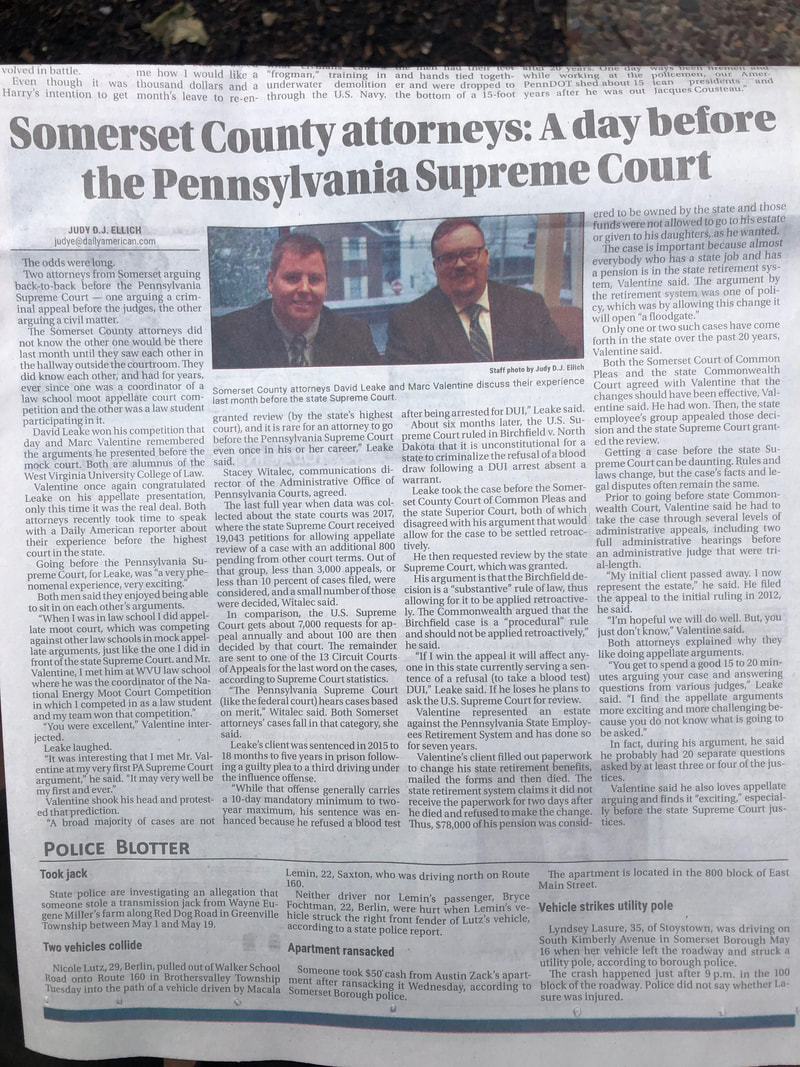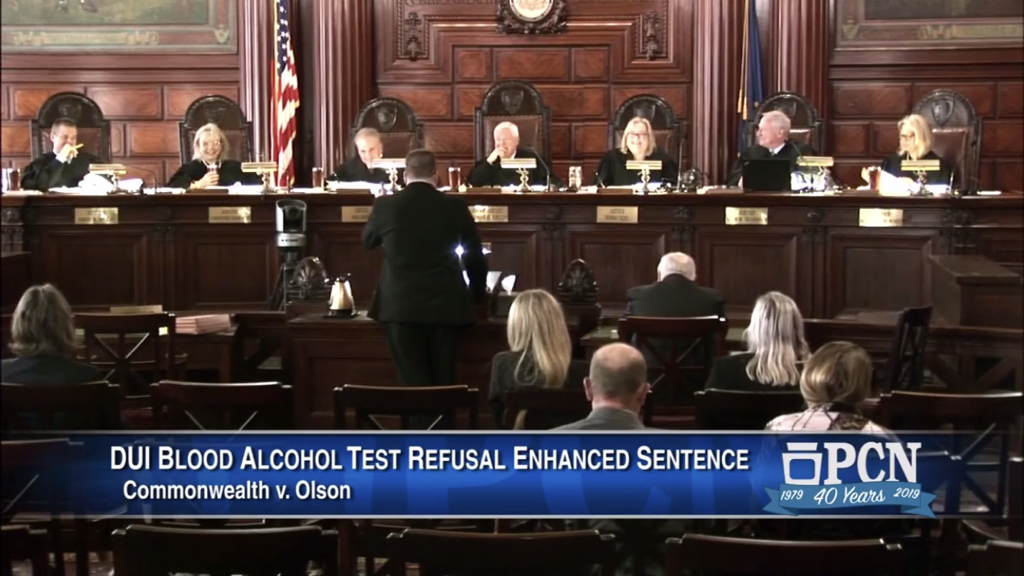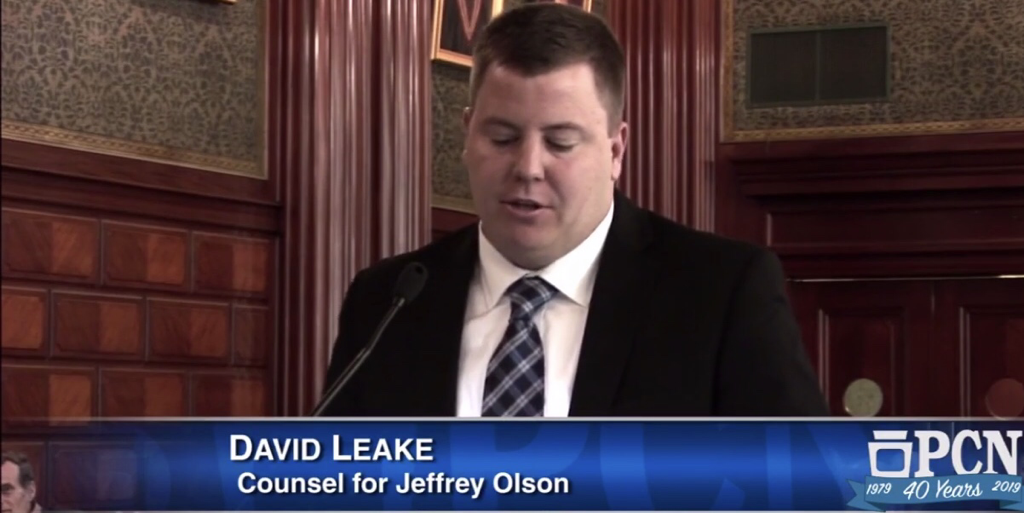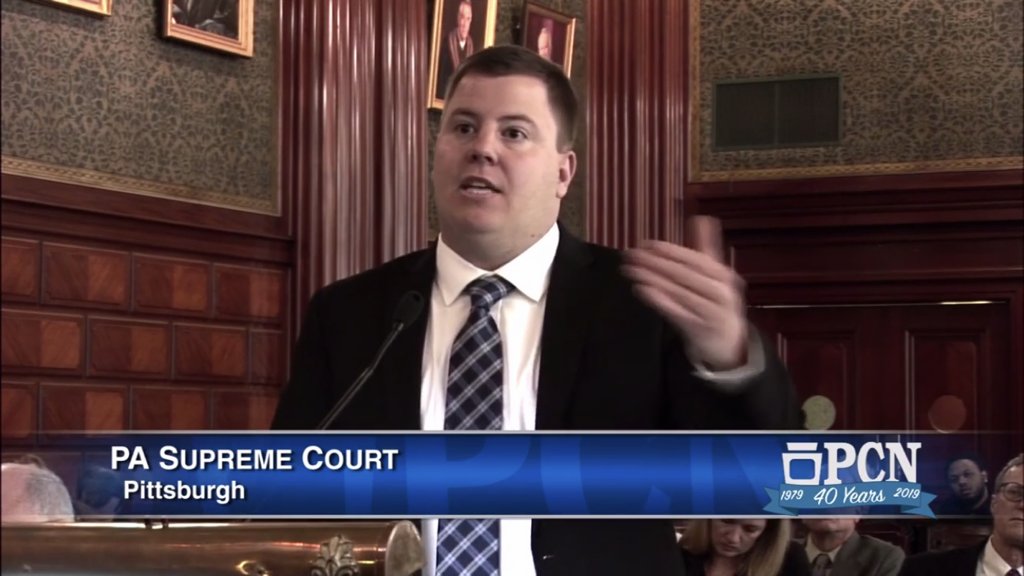|
I was recently added to three national listings for excellence in trial advocacy. I was inducted into the National Trial Lawyers Top 40 Under 40, the Top 100 Trial Lawyers, and Attorney and Practice Magazine's Top 10 Criminal Defense Attorneys. My office has also been nominated as one of the candidates for the 2023 Somerset Daily American Newspaper's Best of Somerset County for Best Law Firm. I have dedicated my life to the law and my clients and I am honored that my dedication is being recognized. I want to thank these organizations, as well as my wonderful clients that regularly leave me wonderful reviews that contribute greatly to this recognition. -David T. Leake, Esq.
0 Comments
Last week, I David T. Leake, Esq., had one of the larger victories of my career for a client that was facing a felony case that a conviction would have resulted in him likely being incarcerated for the remainder of his life. As of last week, after our victory, he is a free man that has been cleared of all charges. He was wrongly accused of the offenses he was facing, and the Commonwealth failed to bring the case to trial in 365 days which is required by the applicable laws. I was able to have the entire case thrown out on what is called a "Rule 600" motion. I filed this Motion in what is called an "Omnibus Pre-Trial Motion", and its success meant we had the case thrown out before it even made it to trial. As a criminal defense attorney with more than nine (9) years experience, I was able to identify the technical deficiency in the Commonwealth's case and file the Motion. The Trial Court held a hearing on the Motion on March 2, 2023, and at the conclusion of the hearing the Trial Judge decided in favor my client and dismissed the Commonwealth's Case. When I have an innocent client cleared of charges it makes all the hard work I put in for my clients worth it. If you have a criminal case, you may have pre-trial issues that I can evaluate, so please contact me.
In three separate divorce consultations I had last week the exact same question arose, so I decided to write a short blog post about the question. When I was in law school, I was research assistant to a brilliant Harvard Law School trained professor named Kenneth Gray. Gray's specialty is property law and I assisted him writing books and articles about complex property law issues. As such, I happen to have a unique background in property law.
Modern property law derives from common law England. A common concept in common law is the real interest known as "dowery" or "curtsey." In modern property law these concepts translate to mean that when you get married your spouse gains an "inchoate" or invisible interest in any real estate you own. Therefore, if you separate, and even later divorce, that interest is not automatically extinguished. The problem is the previous spouse's interest will cloud the real estate's title, meaning you cannot then sell the real estate with clean title thereafter. As such, it is critical that the previous spouse execute what is called a "Quitclaim Deed" conveying their inchoate rights back to you with specifical language to clear the cloud on the title. Unfortunately, this step in the process makes it difficult to effectuate a divorce without an experienced divorce attorney. If you are considering divorce and you own real estate, please contact us. New grading and sentencing enhancements in Pennsylvania went into effect on November 15, 2022. Third and subsequent Tier III DUIs will now be graded as Felonies of the Second Degree, punishable by up to ten (10) years incarceration. Additionally, the Superior Court recently reversed its previous decision to not count previous ARD DUIs for sentence enhancement purposes. Overall, Pennsylvania is cracking down harder than ever on DUIs. It is critical that anyone charged with a DUI seek legal counsel.
On October 31, 2019, in a 5-2 decision the Pennsylvania Supreme Court decided Commonwealth v. Olson, a DUI case Attorney Leake took all the way to the Pennsylvania Supreme Court. While the Pennsylvania Supreme Court ultimately decided against Attorney Leake's client, two of the Supreme Court Justices, including Chief Justice Saylor, agreed with Attorney Leake's position and wrote dissenting opinions.
After the decision was made, several high level law firms approached Attorney Leake offering to volunteer in some cases over a million dollars in legal work to assist Attorney Leake in the preparation of the case to be brought before the US Supreme Court. Recently, Attorney Leake was contacted by an attorney with the MacArthur Justice Institution in Washington D.C., and the director of the Harvard Law School Appellate Clinic, who has volunteered as co-counsel with Mr. Leake on the case. The case has also been certified as a Harvard Appellate Clinic case. Attorney Leake, in conjunction with the attorneys at MacArthur and Harvard Law School's Appellate Clinic are currently working on the Petition for Review that they will be filing with the US Supreme Court soon. Under the Pennsylvania Vehicle Code, DUIs are graded as first, second, or third or subsequent offenses based on a ten year look back period. Therefore, one could get their first DUI in 2000, and eleven years later get a DUI in 2011, and the second DUI would be graded as a "first offense DUI" for purposes of sentence and driver's license suspense. Section 3802 to 3804 of the Vehicle Code dictates said sentence and suspension.
However, Commercial Driver's Licenses ("CDL") are not treated the same way as Driver's Licenses are under the vehicle code in regard to DUIs. Section 1611 of the vehicle code dictates that any second offense DUI triggers a lifetime CDL revocation, BUT THERE IS NO LOOK BACK PERIOD. Therefore, one could get a DUI 20 years ago, and get another DUI that would be treated as a "first offense" for regular driver's license suspension, but would be at the same time treated as a second offense for CDL purposes and result in lifetime CDL revocation. As such it is imperative if you have a CDL and get a DUI to contact an experienced DUI attorney. If you have a CDL and got a DUI call my office immediately. The above article was published today in the newspaper regarding Attorney Leake's DUI case that he argued before the Pennsylvania Supreme Court. Attorney Marc Valentine from Somerset was also before the court that day, which is very exciting as two Somerset attorneys argued before the Pennsylvania Supreme Court that day.
On April 10, 2019, Attorney Leake argued before the Pennsylvania Supreme Court. The argument was televised on PCN and the entire argument can be viewed through the PCN app. The case is titled Commonwealth v. Olson. Attorney Leake represents Mr. Olson who was found guilty of a DUI in the Court of Common Pleas of Somerset County. Attorney Leake appealed the case the whole way to the Pennsylvania Supreme Court. Far less than 1% of cases are even granted review before the Supreme Court. Attorney Leake’s case represents one of the first cases involving a DUI to ever be heard by the Pennsylvania Supreme Court in history. If the case is not decided in his client’s favor, Attorney Leake plans to ask for review by the United States Supreme Court.
In Pennsylvania, custody cases are resolved in one of two ways. The first way is the parents agree on a custody schedule and it is entered by the court. The second way is the Judge decides the case. In the event the Judge decides the case, it will be at the conclusion of a custody trial. During the trial, evidence is presented and argument is heard. The Judge then applies the custody law to the case and formulates a custody schedule.
The custody law provides that the Judge decide the case with the best interests of the child as the guiding principle. The custody statute provides 16 factors the Judge must consider in making the determination, however the 16th factor is any other relevant factor. Therefore, the Judge can consider any relevant evidence in determining the custody schedule. It is imperative to have a skilled child custody attorney. If you have a custody case in Somerset or Cambria County, please call my office today. As a criminal defense attorney in Somerset, Pennsylvania, I have appealed many criminal cases to the Pennsylvania Superior Court. In fact, I currently have a DUI case on appeal to the Pennsylvania Supreme Court.
One important appeal issue I have run into many times is the filing or lack of filing a post sentence motion before an appeal. It is imperative to file a post sentence motion within ten (10) days of the sentencing hearing if you plan to take an appeal of your sentence. In fact, if an appeal is taken and the post sentence motion was not filed, the appellate courts will not even consider any request for modification of your sentence. Even if more than ten days has elapsed since the sentencing hearing, the appropriate route is to get post sentence motion rights reinstated before the appeal. If you plan to appeal a criminal sentence please contact my office. |
AuthorAttorney David T. Leake Archives
June 2023
Categories |
AddressDavid T. Leake, Esq., Law Office
509 North Center Avenue Somerset, Pennsylvania 15501 |
EMAIL
|
Telephone(814) 445-6946
|
HoursOffice Telephone: M-F 8:30am-4:00pm
Appointments: M-Sun 6:00am-8:00pm |







 RSS Feed
RSS Feed
